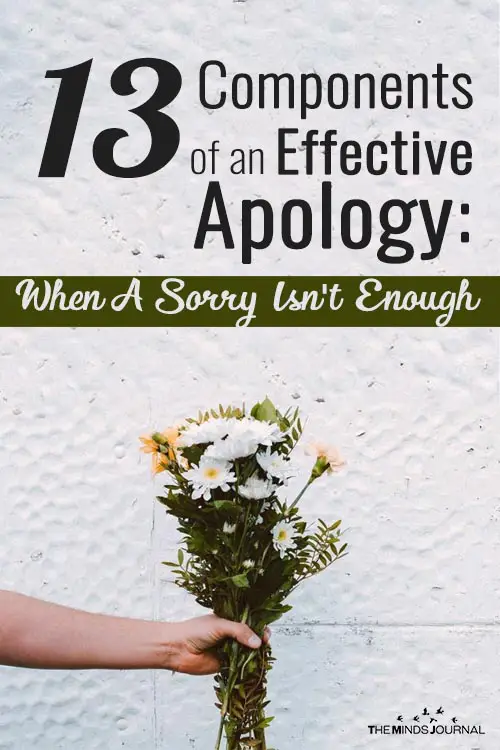What makes an effective apology? Does a simple ‘Sorry’ always work? What to do when a sorry just isn’t enough?
“In this life, when you deny someone an apology, you will remember it at the time you beg forgiveness.”
This is the caption on a poster of the spiritual teacher, Swami Satchidananda who is pictured wearing a loincloth while crouching on a surfboard riding the ocean waves. It’s a profound reminder that no matter how hard we try, sometimes we will make mistakes. Life brings us trouble at times, and we inadvertently make trouble for ourselves. It can’t be helped.
“Learning to surf” is a metaphor for becoming adept at handling life’s difficulties and successfully repairing errors or mistakes that we may have made.
Since we are all (no exceptions) mistake-prone, to varying degrees, it behooves us to become adept in the art of making effective repairs and corrections. We should, of course, by all means, make our best effort to do it “right” the first time, but being human, our best efforts won’t always prevent us from having moments or days when we wish that we could do that one over again. Since we can’t always do “do-overs,” the next best thing is to correct our mistakes, and the best way to start this process is with an apology.
Making an effective apology is both an art and a science. It requires the fulfillment of a number of conditions that must be met in order for both parties to feel satisfied with the outcome. The first thing to keep in mind is exactly that. That is, that both parties must feel complete and satisfied with the outcome in order for things to get back on track after the breakdown.
Related: Before You Apologize To Him or Her, You Must Know This
There are a number of components that increase the likelihood that an apology will be effective. These conditions and guidelines apply to all relationships. We have listed a few of them here.
13 Components of an Effective Apology
1. Sincerity
Make sure that your apology is heartfelt. The word “sincere” means “clean, pure, free from falsehood or pretense.” Don’t bother saying anything until you can really mean it and deliver your message from the heart.
2. Timing
Timing is important in terms of the other person’s readiness to receive your apology. If he or she is still too hurt or upset angry, allow some time for the other person to be able to absorb what you are offering.
3. Intentionality
Don’t use an apology manipulatively to shut another person up or get him or her off your back. Check your intention to make sure that you really are committed to healing the breakdown.
“Never ruin an apology with an excuse.” ―
4. Vulnerability
Try not to indulge in rationalizations or justifications. Disarming yourself of any defensiveness is designed to make you right or the other person wrong.
5. Vision
Hold a vision of what you see coming as a result of your willingness to respectfully participate in a dialogue that is intended to promote greater trust and goodwill in your relationship.
Related: Do Narcissists Ever Feel Sorry?
6. Be specific
Avoid vague generalizations and specify exactly what it is that you do regret having done or said that may have caused the other person’s pain or injury. Also, the statement, “I’m sorry that you feel that way,” is not a statement of apology.
7. Responsibility
Admit that you made an unskillful choice (for example, broke an agreement, made a hurtful remark, had a threatening or condescending tone in your voice). Acknowledge your transgression without defending your actions.
“Any good apology has 3 parts: 1) I’m sorry 2) It’s my fault 3) What can I do to make it right? Most people forget the third part.”

8. One may not be enough
Although a one-time sincere apology may sometimes be enough to get to completion, serious wounds, sometimes require multiple apologies.
9. Make amends
Make an effort to clear up the damage your words or actions may have caused and do your best to restore things to the condition that they were in prior to the breakdown.
10. Commitment
While you can’t guarantee that you will never commit another transgression in the relationship, you can provide reassurance that you are committed to making your best effort to prevent similar future occurrences and let the other person know that you have learned an important lesson from this experience and tell him or her what it is.
“Apologizing does not always mean you’re wrong and the other person is right. It just means you value your relationship more than your ego.” ―
11. Request forgiveness
If the other person is not yet ready to forgive you, respect his (or her) response and thank him for his honesty. Reassure him that you understand how he may feel the way that he does.
Reassure him that he can take all the time that he needs in order to find forgiveness towards you and that you will hang in there until he trusts you as much as you trust yourself to fulfill your promises and intention.
Related: Why Men Struggle To Apologize
12. Patience
Your partner may need to express her pain, hurt, or disappointment before she can be fully present to receive your apology. Resist the temptation to “set the record straight” or to “correct” her interpretation of what actually happened. Allowing her to have her say without interrupting her or disagreeing with her (even if you do) will greatly facilitate the healing process.
13. Gratitude
Thank your partner for being open to restoring trust and express a hope or desire that together the two of you can infuse an even higher level of trust into the relationship as a result of your mutual efforts to deepen your connection.
“An apology is the superglue of life! It can repair just about anything!!” ―
When we have confidence that harm caused to the relationship through unskillful choices can be fully healed, we are motivated to use the methods that we know work to keep our relationship in the best possible condition. The belief that the pre-break trust, harmony, and love can be fully restored, and perhaps even become more than it was prior to the breakdown, prompts us to hold a standard of excellence.
And then we strive to use every incident that occurs in the partnership to become stronger at the broken places. There is surely some work involved in the process of becoming adept at repair, but the rewards of a close, delightful, trusting relationship are well worth the effort!
_________________________________________________________
Linda and Charlie Bloom are excited to announce the release of their third book, Happily Ever After . . . and 39 Other Myths about Love: Breaking Through to the Relationship of Your Dreams.
Written by Linda and Charlie Bloom Originally appeared in Psychology Today











Leave a Reply